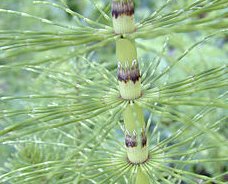Horsetail

  | Horsetail in TCM:Explore the properties of Horsetail according to Chinese
Nutrition and Traditional Chinese Medicine (TCM):
Temperature: neutral
Channels: LU, LV
Flavors: sweet, bitter
Special Properties:
resolves water accumulations
In terms of Traditional Chinese Medicine (TCM) Horsetail is known for its ability to regulate water.
In general the ancient Chinese medical texts cite that it enters the lung and liver. The flavor of Horse tail is sweet and bitter, and it is considered to be neutral in temperature.
Nobel Prize Winner Louis Kervran proposed that the body can transmute silicon into calcium. Adding foods that are high in silicone to your diet, such as horsetail may increase bioavailability of calcium in the body. Horsetail (Equisetum arvense) is toxic and must be simmered for 10 minutes to reduce toxicity. It is a primitive plant that is "near the border" of the plant and mineral kingdom. Horsetail tea is rich in minerals. (HWWF 226)
Disclaimer: In accordance with our terms of service, by using this web site you agree that none of the information found on this web site constitutes medical advice. You should always consult your doctor before trying any particular food or herbal remedy to treat disease.
Folk remedies presented on this site are designed to address specifc TCM diagnoses, and are not one-size-fits-all. If you would like to learn more about Traditional Chinese Medicine (TCM) and how it relates to Chinese Nutrition, you can book in a free call with a licensed professional. There is no obligation to purchase.
[CLICK HERE for your free INITIAL CONSULTATION] |

